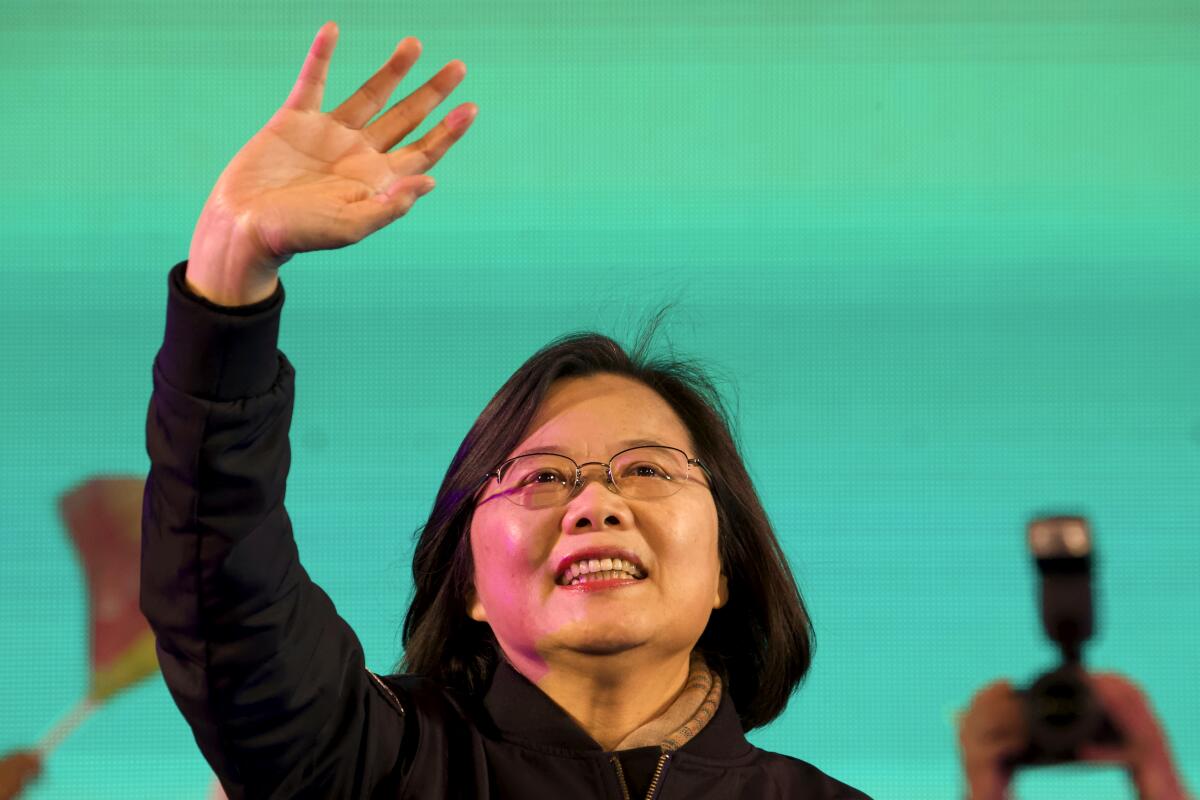Why Tsai Ing-wen’s re-election as president could darken Taiwan’s future

- Share via
In spite of China’s efforts to support her opponent, Tsai Ing-wen won a second term as president of Taiwan in elections on Saturday. The growing world of China skeptics will undoubtedly celebrate her win as a sign of Taiwan’s mature democracy and continued de facto independence in the face of ever-increasing pressure from Beijing.
More likely, however, Tsai’s victory will darken Taiwan’s future as the Chinese Communist Party comes to realize that the only way Taiwan will ever reunify with mainland China is at the end of a gun.
For decades, China’s ruling Communist Party had hoped that tightening economic ties with the “Province of Taiwan” would convince the Taiwanese that they would be better off as part of the People’s Republic. President Xi Jinping has doubled down on this logic, adopting new measures to attract Taiwan businesses and human capital and to integrate industries more deeply across the Taiwan Strait.
Beijing’s official line has been that it is progressing toward peaceful reunification and that the pro-independence agenda of Tsai’s Democratic Progressive Party is losing support in Taiwan. China was reassured by the 2018 local elections, in which the more pro-mainland Kuomintang Party won 13 out of 20 jurisdictions. Beijing leaders believed the Taiwanese people would see the material benefits and prestige to be gained from reunification as China’s economic strength and international status grew.
But Tsai has explicitly rejected China’s formulation of “one country, two systems,” and her re-election will likely convince Chinese leaders that peaceful reunification is a pipe dream. They would be right. Recent polls show the people of Taiwan are less and less interested in unification and prefer either the status quo or independence. The younger generation, born after Taiwan transitioned to a democracy, has known nothing but the freedoms it currently enjoys, and is more reluctant than the older generation to give them up for what Beijing has to offer.
At the same time, China’s 2005 Anti-Secession Law mandates an armed reunification if peaceful reunification is not possible. And, according to Chinese opinion polls, 89% of people on the mainland favor forced reunification. Luo Yuan, a major general in the Chinese military, recently said that China’s leaders “can only follow the will of all Chinese nationals [and] realize reunification by force,” should Taiwan refuse to cede to Beijing’s leadership.
A Chinese attack on Taiwan would, of course, have major implications for the United States. While America no longer has a treaty commitment to defend Taiwan, the Taiwan Relations Act of 1979 specifies that “any effort to determine the future of Taiwan by other than peaceful means, including by boycotts or embargoes, [is] a threat to the peace and security of the Western Pacific area and of grave concern to the United States.” Practically, there would be serious pressure for Washington to come to Taiwan’s defense militarily — in short, a war between two nuclear-armed powers with all the attendant costs.
The enormity of those costs, both militarily and economically, have over the years reassured many that Beijing would never take up arms against Taiwan unless Taipei declares outright independence. But China under Xi is a different beast. He has publicly called for concrete movement toward reunification, an explicit demand that stakes his legitimacy on progress in that direction. By doing so, he moved the goalpost from preventing Taiwan independence, which means living with the 40-year-long status quo, to an actual change in the nature of the cross-strait relationship, which is substantially less achievable without the use of force.
For the first time in Chinese history, Xi will also have at his disposal a military capable of forcing unification. Chinese military modernization has been geared toward developing combat capabilities and training to invade and take the island. While many Western observers think China will be able to do so in the next five to eight years, Chinese military leaders have told me that they will be ready within a year.
Xi has warned that “the political division across the Strait … cannot be passed on from generation to generation.” The re-election of Tsai may be perceived by Beijing as reason to abandon a peaceful reunification policy. Should Beijing begin preparing for an attack, it’s unclear what the United States will do. Some Chinese strategists question whether the U.S. military could effectively protect Taiwan against China’s ever increasing military might.
There is no time to waste. To avert conflict, Washington needs to place its full attention on the Indo-Pacific strategy now. If the United States continues to direct its focus on conflicts elsewhere, armed reunification will become an even more attractive option to Beijing. The repercussions will be felt in that region for generations.
Oriana Skylar Mastro is a resident scholar at the American Enterprise Institute and an assistant professor of security studies at Georgetown University.
More to Read
A cure for the common opinion
Get thought-provoking perspectives with our weekly newsletter.
You may occasionally receive promotional content from the Los Angeles Times.









